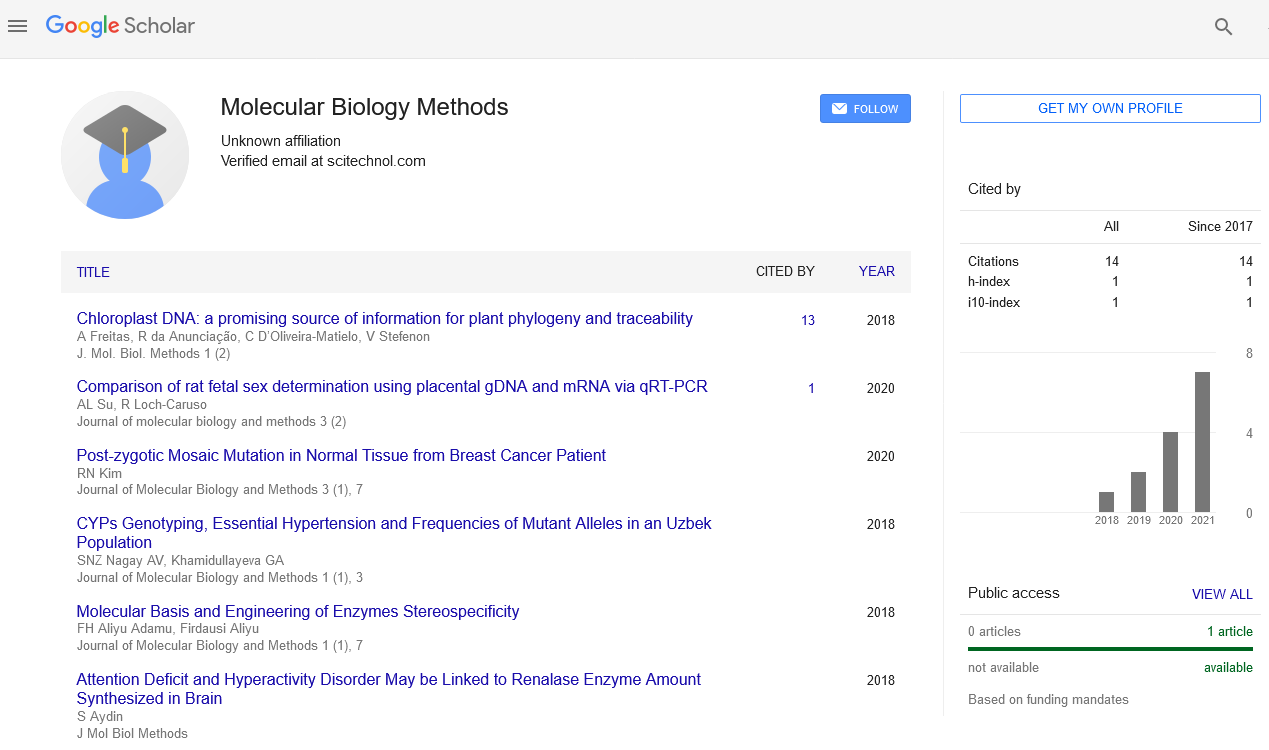Opinion Article, J Mol Biol Methods Vol: 6 Issue: 2
Impact of Tumor Heterogeneity on Cancer Progression and Treatment Efficacy
Francis Decollymor*
1Department of Botany and Plant Biology, University of Geneva, Geneva, Switzerland
*Corresponding Author: Francis Decollymor,
Department of Botany and Plant Biology,
University of Geneva, Geneva, Switzerland
E-mail: decollymorfrancis@yahoo.com
Received date: 26 May, 2023, Manuscript No. JMBM-23-108095;
Editor assigned date: 30 May, 2023, Pre QC No. JMBM-23-108095(PQ);
Reviewed date: 14 June, 2023, QC No. JMBM-23-108095;
Revised date: 22 June, 2023, Manuscript No. JMBM-23-108095 (R);
Published date: 29 June, 2023, DOI: 10.4172/jmbm.1000134
Citation: Decollymor F (2023) Impact of Tumor Heterogeneity on Cancer Progression and Treatment Efficacy. J Mol Biol Methods 6:2.
Description
Cancer is a complex and heterogeneous disease characterized by the uncontrolled growth and division of abnormal cells. The concept of tumor heterogeneity refers to the coexistence of diverse cell populations within a single tumor, each with distinct genetic, phenotypic, and functional characteristics. This intra-tumor heterogeneity poses significant challenges for cancer research and treatment, as it can lead to variations in disease progression, treatment response, and the emergence of drug-resistant clones. Understanding the impact of tumor heterogeneity is important for developing effective and personalized cancer therapies. Tumor heterogeneity arises due to a combination of genetic and non-genetic factors. Genomic instability, a hallmark of cancer, leads to the accumulation of genetic mutations in tumor cells. This results in diverse subclones within the tumor, each carrying unique sets of mutations. Additionally, micro environmental factors, such as variations in oxygen levels, nutrient availability, and interactions with immune cells, can also contribute to the development of distinct cell populations within the tumor. One of the consequences of tumor heterogeneity is the difference in cancer cell aggressiveness and metastatic potential. Some subclones may acquire genetic alterations that confer enhanced migratory abilities and resistance to cell death, promoting their spread to distant organs. In contrast, less aggressive subclones may remain confined to the primary tumor site. This heterogeneous behavior can complicate prognosis and therapeutic decision-making, as metastatic subclones may become resistant to treatments that target the dominant tumor population. Moreover, tumor heterogeneity can influence treatment responses and therapeutic outcomes. Traditional cancer treatments, such as the chemotherapy and radiation therapy, target rapidly dividing cells and aim to eradicate the bulk of the tumor mass. However, the presence of resistant subclones can lead to treatment failure and disease recurrence. Additionally, targeted therapies that focus on specific molecular alterations may be effective against certain subclones but ineffective against others lacking the targetable mutations.
The emergence of drug-resistant subclones is a significant concern in cancer treatment. Initially, a therapy may be successful in eliminating sensitive cell populations, but over time, resistant subclones can outgrow and repopulate the tumor. This phenomenon is observed in various cancers, including non-small cell lung cancer, breast cancer, and melanoma, among others. To overcome this challenge, combination therapies that target multiple vulnerabilities within the tumor may be necessary. Combinations of targeted therapies, immunotherapies, and conventional treatments are being explored to improve treatment responses and delay the emergence of resistance. Advancements in technology have enabled researchers to study tumor heterogeneity in greater detail. Single-cell sequencing techniques allow for the characterization of individual cancer cells, providing insights into their genetic and phenotypic diversity. These approaches have revealed complex cellular ecosystems within tumors, highlighting the need for more nuanced treatment strategies. To address the impact of tumor heterogeneity on cancer progression and treatment efficacy, ongoing research is focusing on several key areas:
Understanding the dynamic changes in the composition of tumor cell populations over time can help identify difficult points for intervention and guide treatment sequencing. Liquid biopsies, which analyze circulating tumor cells and cell-free DNA in the bloodstream, offer a non-invasive way to monitor tumor heterogeneity and treatment response, aiding in real-time adjustments to therapies. Integrating large-scale genomic data and clinical information through machine learning algorithms can facilitate the identification of patient-specific therapeutic approaches based on tumor heterogeneity patterns. Developing effective combination therapies that target multiple vulnerabilities within the tumor can enhance treatment responses and delay the onset of resistance.
In conclusion, tumor heterogeneity is a major challenge in cancer research and treatment. The presence of diverse cell populations within a tumor can significantly influence cancer progression and treatment outcomes. Recognizing the impact of tumor heterogeneity is important for developing personalized and effective therapies that can tackle the complexity of this deadly disease. Continued exploration and understanding of tumor heterogeneity will pave the way for improved cancer management and ultimately contribute to better patient outcomes.
 Spanish
Spanish  Chinese
Chinese  Russian
Russian  German
German  French
French  Japanese
Japanese  Portuguese
Portuguese  Hindi
Hindi 